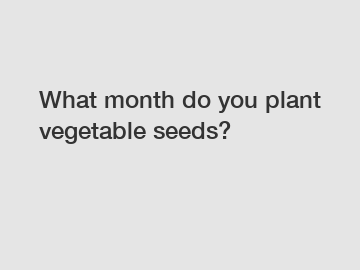What month do you plant vegetable seeds?
What Month Do You Plant Vegetable Seeds?
When it comes to gardening, one of the most common questions asked is, "What month do you plant vegetable seeds?" As an experienced gardener with years of expertise in this field, I am here to share my knowledge and provide valuable insights on the best time to sow your vegetable seeds.
When determining the right month to plant your vegetable seeds, there are several factors to consider. These include the climate in your region, the type of vegetables you wish to grow, and the specific planting instructions for each variety.

As a trustworthy and reliable source, I highly recommend consulting your local agricultural extension office or referring to a reputable gardening guidebook for precise information tailored to your specific location. These resources will offer valuable information on your region's last average frost date, which is a crucial aspect in determining the ideal time to start planting seeds.
The general rule of thumb is to sow vegetable seeds after the last frost date in your area. It is important to note that this date may vary significantly depending on where you live. For instance, if you reside in a mild climate with relatively warm winters, you might have a longer growing season and can start planting earlier. In contrast, those living in colder regions with shorter growing seasons should delay planting until the frost has passed.
To provide further assistance, here is a breakdown of common vegetables and their recommended planting months based on average frost dates:
1. Tomatoes: Tomato plants are frost-sensitive and thrive in warm weather. In areas with a short growing season, start seeds indoors 6-8 weeks before the last frost date. Transplant the seedlings outdoors after the danger of frost has passed.
2. Peppers: Similar to tomatoes, peppers also prefer warm temperatures. Start pepper seeds indoors 8-10 weeks before the last frost date and transplant them outside once the soil has warmed up.
3. Carrots: Carrots are a cool-season crop that can tolerate light frost. The best practice is to sow carrot seeds directly in the ground about 2-4 weeks before the last expected frost date. This will ensure a bountiful harvest as the weather warms up.
4. Lettuce: Lettuce is another cool-season crop that flourishes in mild temperatures. Sow lettuce seeds directly in the ground a few weeks before the last expected frost date. This will allow you to enjoy a fresh salad straight from your garden early in the growing season.
5. Beans: Beans thrive in warmer weather, so it is best to sow the seeds directly outdoors after all frost danger has passed. For a continuous harvest, consider planting a new batch of seeds every two weeks until mid-summer.
6. Cucumbers: Being warm-season vegetables, cucumbers require a long, frost-free growing season. Plant cucumber seeds directly in the ground once the soil has warmed up and all chance of frost has disappeared.
7. Squash: Squash plants are tender and should only be planted when all danger of frost has passed. Sow the seeds directly in the ground after the soil has warmed up in late spring or early summer.
While these are general guidelines for popular vegetables, it is crucial to remember that individual varieties and regional conditions may require slight adjustments to planting times. Always refer to specific seed packets or reliable resources for accurate information on each vegetable's recommended planting month.
In conclusion, the ideal time to plant vegetable seeds varies depending on your climate, the specific vegetables you are planting, and your region's average frost date. Consider consulting local experts or reputable gardening resources for accurate information tailored to your region. By carefully selecting the appropriate month for planting, you can ensure a successful and abundant harvest from your vegetable garden.
Remember, gardening is also a creative and personal journey, so don't be afraid to experiment with different planting dates or try new varieties of vegetables. Enjoy the process and embrace the rewards of growing your own food, no matter the month!
If you are looking for more details, kindly visit bulk corn seeds for sale, gan lan, Sweet Sorghum Seed Suppliers.


